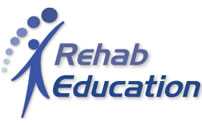Alliance Member:
Code:
To register for this course, go to: http://www.rehabedge.com/detail.aspx?id=690
Pediatric Hand Therapy and Splinting
Rehab Education

Format(s): Live Seminars
Discipline(s): Physical Therapy / Occupational Therapy
Contact Hours: 14
Registration Fee: $504.00
Objectives
Upon completion, participant will be able to::
recognize the normal development of the hand and implications for treatment.
identify the following conditions found in pediatric hand patients and develop a pre and post-operative treatment plan: Brachial Plexus Injuries; Radial Ray Deficiencies; Thumb-in-Palm Deformities; Trigger Thumbs/Fingers; Arthrogryposis; Camptodactyly; Syndactyly releases; Common Pediatric Injuries; Cerebral Palsy; Juvenile Rheumatoid Arthritis; Epidermolysis Bullosa.
identify immobilization and mobilization splinting principles as they apply to pediatric patients.
identify appropriate splint options for the above listed conditions and fabricate the appropriate splint from a provided pattern
Target Audience
OT's, PT's, PTA's, OTA's, CHT's with intermediate level skills.
Confirmation Notes
CE Credits
14 credit hours
Accepted by many professional credentialing organizations and state professional regulatory boards. Check with your state board/credentialing agency to verify. Certificate of attendance will be issued to all participants upon completion of the course and may be used for CEU verification of credits. CE Credits vary by state. Please check with your state board/certifying agency to confirm conversion of contact hours to CE.
Physical Therapy Board of California: The Physical Therapy Board of California recognizes Rehab Education, LLC as an approval agency to approve providers offering continuing competency courses for CA licensed PTs and PTAs. This course is approved for 14 contact hours.
California OT Board: This course and instructor have been approved by the CA Board of OT for 3.5 contact hours of post-professional education in the advanced practice area of hand therapy. (Approval #22-H5)
Idaho Occupational Therapy Board: This course has been approved by the Idaho Occupational Therapy Board.Approval #4078.
Idaho Physical Therapy Board: This course has been approved by the Idaho Physical Therapy Board. Approval #4079
Illinois State Board of Physical Therapy: Approved CE Sponsor by Illinois State Board of Physical Therapy, Division of Professional Regulations, #216.000227 for courses completed by 09-30-2014.
North Carolina Board of Physical Therapy Examiners: This course has been approved by virtue of Illinois CE Provider Approval #216.000227 for 14 contact hours. (Course must be completed by 09-30-2014)
NY State Physical Therapy Board: Rehab Education, LLC is recognized as an approved provider for courses completed by 05-10-2016 of PT and PTA continuing education by the NY State Education Department Board of Physical Therapy.
Texas Board of Physical Therapy Examiners: This course has been approved by the Texas Board of Physical Therapy Examiners as meeting continuing education requirements for PTs for 14 CEU. Approval# 53591A. (Course must be taken between 11-02-2012 and 11-01-2013).
Virginia Board of Physical Therapy : This course has been approved by virtue of Illinois CE Provider Approval #216.000227 for 14 contact hours. (Course must be completed by 09-30-2014).
AOTA Approved Provider #6177. These states currently recognize AOTA Approved Providers for OT continuing education either in regulatory language or by formal written communication to AOTA:
Alaska
Arkansas
Delaware
District of Columbia
Illinois
Indiana
Kentucky
Louisiana
Maryland
Minnesota
Mississippi
Missouri
Montana
Nevada
New Hampshire
New York
North Carolina
Ohio
Oregon
Oklahoma
Rhode Island
South Carolina
Tennessee
Texas
Vermont
Virginia
Agenda
DAY ONE
7:30-8:00 Registration/Continental Breakfast
8:00-8:15 Review of the course content
8:15-8:30 Unique Aspects of Pediatric Hand Therapy
8:30-8:45 Normal Hand Development
8:45-9:00 Pediatric Hand Evaluation
9:00-10:00 Therapy for Children with Brachial Plexus Palsy
10:00-10:15 Break
10:15-12:15 Treating Children with Congenital Hand Differences:
â– Radial Ray Deficiencies
â– Hypoplastic Thumbs
â– Radial Club Hands
â– Thumb in Palm Deformities
â– Congenital Trigger Thumbs/Fingers
â– Arthrogryposis
â– Camptodactyly
â– Syndactyly releases
12:15-1:00 Lunch
1:00-2:00 Sharing of treatment ideas
2:00-3:00 Pediatric Trauma-fractures, tendon injuries, etc
3:00-3:15 Break
3:15-4:30 UE Management of the Child with Cerebral Palsy
4:30-5:30 Treatment of Pediatric Rheumatological Conditions
DAY TWO:
7:45-8:00 Continental Breakfast
8:00-9:15 Pediatric Splinting
â– Purposes of splints
â– Classification of splints
â– Splint decision making
â– Pediatric splinting techniques
â– Review of prefabricated pediatric splints
9:15-10:15 Demonstration and fabrication of dorsal wrist splint
10:15-11:15 Demonstration and fabrication of volar based MP stabilization thumb splint
11:15-11:45 Demonstration and fabrication of weight bearing splint
11:45-11:55 Demonstration and fabrication of foam/noodle splint
11:55-12:00 Demonstration and fabrication of neoprene supination assist splint
12:00-12:45 Lunch
12:45-1:45 Demonstration and fabrication of camptodactyly (Serial static ext.) splint
1:45-2:50 Demonstration and fabrication of 2 piece dorsal resting splint
2:50-3:00 Course evaluation
Description
When presented with pediatric patients with complex conditions, therapists may face multiple challenges including specialized splinting needs (such as making a finger splint for a one week old infant), pre-surgical and post-surgical intervention strategies (such as deciding when to start therapy after a tendon transfer), and developmental or functional issues (such as how to get a child with no elbow flexion to be able to feed himself).
During the first day, this presentation focuses on common pediatric conditions that result in a child being referred to therapy including Cerebral Palsy, Juvenile Rheumatoid Arthritis, Brachial Plexus Injuries, Radial Ray Deficiencies, Camptodactyly, Thumb-in Palm Deformities, Trigger Fingers, Epidermolysis Bullosa, and Arthrogryposis. The presenter will share her expertise in knowledge of normal hand development, evaluation and therapeutic intervention, including splinting.
The second day focuses on pediatric splinting. When working with the pediatric population, therapists are challenged by the need to fabricate small size splints and the decisions regarding splint purpose, style, design and materials. The biggest challenge may involve gaining the child?s cooperation during the splint fabrication and compliance with the splint use at home. After attending this course, participants should be able to rise to all of these challenges.
Please note:
Live courses require a minimum number of participants to operate. You will receive a written confirmation from Rehab Education when minimum is met. Do not purchase non-refundable travel until you receive official written confirmation.
Dates and Locations